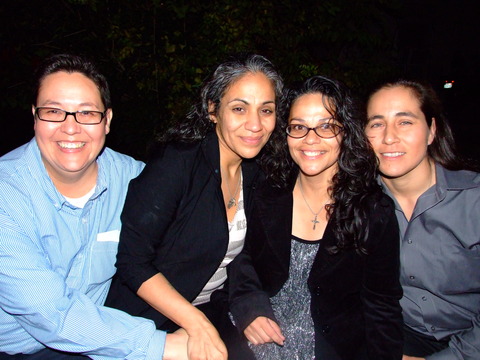[Note: Friends of Justice is a personal blog. I speak only for myself.]

(Kristie Mayhugh, Cassandra Rivera, Elizabeth Ramirez, Anna vasquez — photo by Debbie Nathan)
The National Center for Reason and Justice has sponsored the San Antonio 4 since we learned about their plight, in 2008. Before Anna, Cassie, Kristie and Elizabeth found us, they’d written to other groups asking for help but were turned down.
NCRJ is a unique, watchdog group. One of our missions is identifying false allegations of harm to children, including sexual abuse. We investigated the San Antonio 4 case and discovered that the medical evidence which helped convict the women was severely flawed. We were the first to receive a call from one of the alleged victims when she came forward to recant her accusations. We recruited the Innocence Project of Texas (IPTX) to do legal work.
NCRJ is overjoyed that, with our assistance and IPTX’s, as well as that of a growing and vibrant support community, these women are on the road to freedom and hopefully exoneration.
But the road is long. In America, anyone accused of hurting children is automatically condemned as the lowest of the low. Such people find it almost impossible to get help to preserve their due process rights, even from those who otherwise passionately defend civil and human rights.
This has to change. This is why NCRJ sponsors cases like the San Antonio 4 and others nationwide. We do this to help free innocent people and make the criminal justice system more rational, humane, and just. We do it so people can learn about the larger issues embedded in these cases, then confront them. What are these issues?
For one, what happened to the San Antonio 4 shows how easy it is in America for ordinary people to be falsely accused, denied due process, and banished from society. All kinds of ordinary people get caught up in our justice system. Some are more vulnerable than others.
Anna, Kristie, Elizabeth and Cassie are lesbians. The authorities knew that back in 1990s. As their case shows, gay people are not always protected by the criminal justice system. On the contrary, they can be targeted. The San Antonio 4 are low-income people of color—also easy targets for our culture’s growing anxieties and tendency to maintain order by accusing, punishing, and ostracizing.
As the criminal justice system can railroad the innocent, it tramples the civil and human rights of people who have committed crimes. Child sex abuse is a terrible crime. But using society’s revulsion for this crime, the system has employed sex offenders as a wedge to treat every accused person with increasing harshness both in prison and afterward—sometimes for a lifetime.
Even guilty people have human and due process rights. Yet even when they have served their time and paid their debt to society, they are typically banished from the community, undermining their ability to reintegrate as law-abiding people, and hurting their families and communities.
One form of banishment is the sex offender registry and accompanying restrictions on housing, work, travel, and social life. These policies do not protect children. In fact, studies show that they may put children at increased risk. These rules are often senselessly cruel.
More than two million people are in prison in the U.S. Per capita, and in pure numbers, we incarcerate more people than any other country. Many good people are disturbed by this. Many worry about the barbaric way that the accused and convicted get treated. But when confronted with people labeled as child abusers, many good people stop thinking.
This situation endangers us all. As long as we allow some people to be turned into pariahs, the justice system will be able to get away with injustice—denying due process to anyone and everyone.
That’s why the San Antonio 4 case is nationally important. That’s why NCRJ is proud to support Anna, Cassie, Kristie, and Elizabeth.
Please support our work: http://ncrj.org/donate/